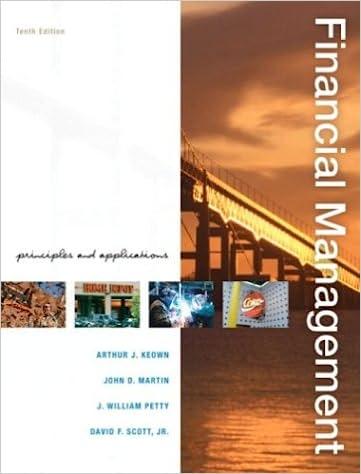In an uncertain world, capital budgeting attempts to determine what the future of a new product will
Question:
In an uncertain world, capital budgeting attempts to determine what the future of a new product will bring and how then to act on that forecast. We never know for certain what the future will bring, but we do arrive at some idea ofwhat the distribution of possible outcomes looks like. Unfortunately, when there is uncertainty, the outcome is not always a good one. For example, what happens if the government rules that our product is not safe? The answer is that \ve must abandon the product. The question then becomes what to do with the inventory we currently have on hand. We certainly want to deal with it in a way that is in the best interests of our shareholders.
We also want to obey the law and act ethically. As with most ethical questions, there isn't necessarily a right or wrong' answer.
When it comes to the safety of young children, fire is a parent's nightmare. Just the thought of their young ones trapped in their cribs and beds by a raging nocturnal blaze is enough to make most mothers and fathers take every precaution to ensure their children's safety. Little wonder that when lire-retardant children's pajamas hit the market in the mid19705, they proved an overnight success. Within a few short years, more than 200 million pairs were sold, and the sales of millions more were all but guaranteed. For their manufacturers, the future could not have been brighter. Then, like a bolt from the blue, came word that the pajamas were killers.
In June 1977, the U.S. Consumer Product Safety Commission (CPSC) banned the sale of these pajamas and ordered the recall of millions of pairs. Reason: The pajamas contained the flame-retardant chemical Tris (2,3-dibromoprophyl), which had been found to cause kidney cancer in children.
Whereas just months earlier the 100 medium- and smallgarment manufacturers of the Tris-impregnated pajamas couldn't fill orders fast enough, suddenly they were worrying about how to get rid of the millions of pairs now sitting in warehouses. Because of its toxicity, the sleepwear couldn't even be thrown away, let alone be sold. Indeed, the CPSC left no doubt about how the pajamas were to be disposed of-buried or bumed or used as industrial wiping cloths. All meant millions of dollars in losses for manufacturers.
The companies affected-mostly small, family-run operations employing fewer than 100 workers-immediately attempted to shift blam.e to the mills that made the cloth. VVhen that attempt failed, they tried to get the big department stores that sold the pajamas and the chemical companies that produced Tris to share the financial losses. Again, no sale. Finally, in desperation, the companies lobbied in Washington for a bill making the federal government partially responsible for the losses. It was the government, they argued, that originally had required the companies to add Tris to pajamas and then had prohibited their sale. Congress was sympathetic; it passed a bill granting companies relief. But President Carter vetoed it.
While the small firms were waging their political battle in the halls of Congress, ads began appearing in the classified pages of Women J' Wear Daily. "Tris-Tris-Tris.... We will buy any fabric containing Tris," read one. Another said, "Tris-we will purchase any large quantities of garments containing Tris.'" The ads had been placed by exporters, who began buying up the pajamas, usually at 10 to 30 percent of the normal wholesale price. Their intent was clear: to dumpb the carcinogenic pajamas on overseas markets.
Questions 1. Was the dumping in this case ethical? Those involved in the dumping might have argued that the people receiving the pajamas would not have otherwise had access to such clothing and were notified of the health and safety hazards. Does this affect your feelings about the case?
What do you think about the exportation of the Dalkon Shield? Can it be justified because the rate of dying during childbirth in Third World countries is extremely high, and, as such, any effective birth control device is better than none?
2. What obligations did the financial managers have to their shareholders to do whatever is possible to avoid major financial losses associated with these products?
3. Is it still immoral or unethical to dump goods when doing so does not violate any U.S. laws? How about when those receiving the goods know the dangers? Why do you think dumpers dump? Do you think they believe what they are doing is ethically acceptable?
Step by Step Answer:

Financial Management Principles And Applications
ISBN: 9780131450653
10th Edition
Authors: Arthur J. Keown, J. William Petty, John D. Martin, Jr. Scott, David F.





